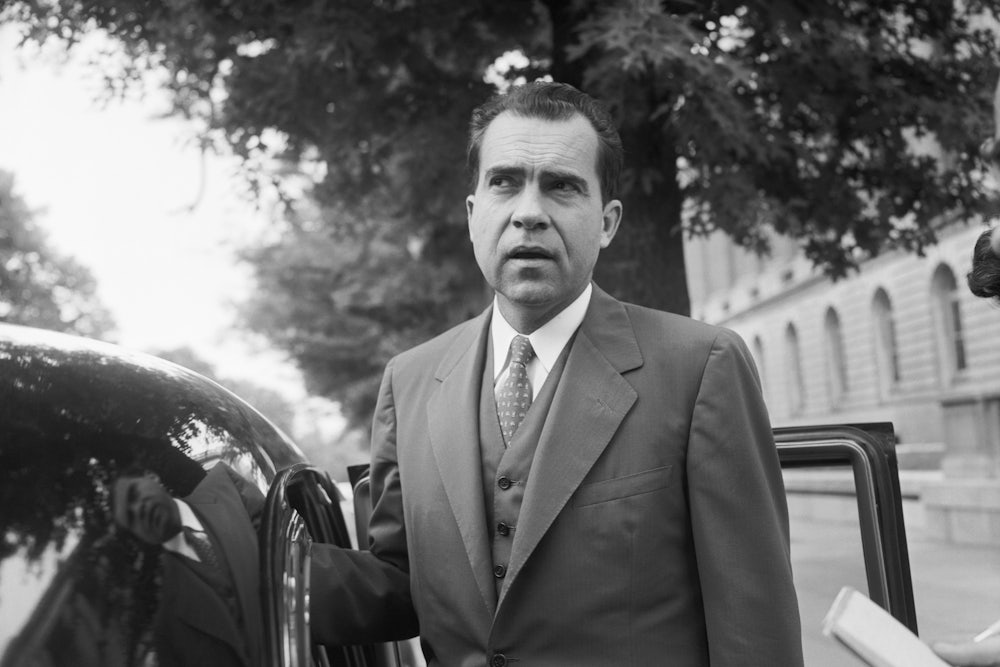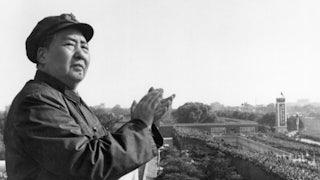Two specimens of light reading have been just been offered for the entertainment of the American electorate. One is, to waste no words, Nixon, by ralph de Toledano. This Is Nixon by James Keogh is the other. Both authors presumably share Mr. Eisenhower’s delight that Richard Nixon will stick with the team in ‘56. Duty compels him to run again. To characterize these two biographies of our Vice President, one must say more than that they are bad. One must fall back upon a word that has—it is a pity—become unfashionable in modern writing: I mean the word, sincere.
Without reflecting upon the authors’ motives, which do not concern me, I would say that the special badness of these books consists in their lack of sincerity: they do not try to conduct a reasonable discourse; they are calculated exercises in arm-twisting and brain-squeezing. Nor is this necessarily due to their conservative bias. Similar studies could, and no doubt will, be written about Stevenson or Khrushchev or Nehru. For what we have here are not books worthy of review, but products of “mass culture,” that vast industry of prefabricated amusement & propaganda which increasingly sets the tone of American life; and it is as items of commerce rather than as intellectual communication that such writings need to be considered. This is a processed badness, the sort an inexperienced writer could never manage by himself, since it requires professional training to write in such a glossy, packaged and soulless way. If IBM ever invents a writing machine, it will probably write like Mr. Keogh; if the machine can then be “infed” with the bile of an ex-radical, it will write like Mr. Toledano.
The Vice President, claim both authors, has been misunderstood: far from being an opportunist he is a principled conservative; far from being a ruthless political operator he is a kindly sensitive consciente-burdened leader. This argument, if it is to have any impact at all, must be directed mainly to the eggheads, since it is they who have objected most to Nixon’s intellectual and cultural style. (It is as if these writers, in some crevice of their hearts, still wanted the approval of the intellectuals.) Yet the tone of these books, particularly of Mr. Toledano’s Cohn-&-Schine prose, suggests a curious kind of inefficiency, a self-defeating effort to persuade those who in the course of the argument are most to be scorned.
To soften the contours of Nixon’s public image, both writers present a good many homely details and cogent sayings. “The Vice President,” writes Mr. Keogh, “usually eats breakfast at a small table in the kitchen….Standard menu: two kinds of fruit, toast and one cup of coffee (a little sugar, a little cream).” What, you may wonder, is the point of such trivia. Well, in the calculations of newsmagazine writing, these touches are supposed to make their subjects more “human” and colorful, though in actuality they merely provide stock formulas that prevent any credible human image from appearing.
Yet amidst this accumulation of miscellaneous junk one occasionally finds a jewel. Mr. Toledano quotes the Vice President as saying: “The only time to lose your temper in politics is when it’s deliberate.” What a priceless remark that is—and all the more so since Nixon does not even seem to suspect that, in the nature of things, you can lose your temper only when it’s not deliberate. As the self-portrait of an utterly manipulative spirit, of an eager grasping will, the remark is beyond praise: Stendhal could do no better.
Reading through Nixon’s speeches, it becomes clear that for him neither ideas nor words have a claim to autonomous dignity and significance: they are weapons with which to bloody opponents; tags and slogans to be utilized in political publicity. It is hard and perhaps impossible to say to what extent this is the result of planned demagogy and to what extent he is himself caught up in the fetishistic coils of the ad-man’s rhetoric.
When Nixon declares himself opposed to the “welfare state” because it “absorbs the citizens” and in favor of the “general-welfare state” because it is the servant of the citizen—When he describes the policies of the Truman Administration as “socialist left-wing policies”—When he declares himself in favor of federal slum clearance but against federal housing projects, presumably on the ground that for the government to knock down bad houses is “dynamic conservatism” but to put up good ones is “socialism”—Is this trickery or muddle?
I doubt that anyone can tell. I doubt that even Mr. Toledano can tell.
What matters is that in public life men learn to play tricks with their muddles, and other men learn to praise them for it. So it is that Mr. Keogh can quote, without any evidence of moral disturbance, Nixon’s old law partner who remembers that as a young lawyer the Vice President “had courtroom psychology. He could talk so that butter wouldn’t melt in his mouth, or he could take hold of a cantankerous witness and shake him like a dog.” So it is that Mr. Keogh can cite as an example of Nixon’s campaign oratory “Adlai the appeaser…who got a Ph.D. from Dean Acheson’s ‘College of Cowardly Communist Containment’’’ while continuing to describe the Vice President as a man of sensibility and conscience. So it is, too, that Mr. Toledano can say that Nixon was fighting those Americans who urged that “the United States should recognize Red China…should oust President Rhee, should kowtow to India at all costs.” Who it was that urged this country to kowtow to India “at all costs” and what “all costs” means in this context, Mr. Toledano does not say. I don’t think he can, either.
In the nightmare-world of mass culture and advertising-agency politics, it becomes impossible to distinguish between the manipulators and the manipulated. Surely everyone has had the experience of overhearing a TV or radio listener say about some particularly slick piece of advertising, “Gee, that’s good psychology,” without even being aware that it is he himself upon whom the “psychology” is being worked. So it is with the speeches of the Vice President: the process of mass agitation and the process of self-deception tend to become inseparable.
Except, I would say, in one case. Mr. Toledano makes it perfectly clear that in his relations with McCarthy the Vice President knew exactly what he was doing. “Nixon,” writes Mr. Toledano, “felt a certain responsibility for McCarthy or for any other individual who took up the fight against Communism.” When “Nixon offered him the use of his files to help document his charges, Mccarthy gratefully accepted his offer….” The friendship warmed. Later, after he had brought McCarthy together with the top figures of the Administration but had failed to cement an alliance, he urged a policy of piecemeal co-operation with McCarthy: “support him when he was right…criticize him when he was wrong.” Only after McCarthy forced a break did Nixon say (apparently in a statement to Mr. Toledano) that “McCarthy’s intentions were right, but his tactics were, frankly, so inept at times that he probably did our cause more harm than good.”
Even at the end, it should be stressed, Nixon never ventured a principled description, let alone a moral judgement, of McCarthyism. His only complaint, and how revealing it is of his small-minded shrewdness, was that Joe was “inept.” And by comparison, Joe was.
One thing is clear about the Vice President: both those who admire him and those who dislike him agree that he represents something “new” in American life. I think so too, and in the paragraphs that remain I want to suggest what that may be.
At a time when political and social choices are severely limited by the pressures of the Cold War, the divergent tendencies within our society tend to come through in “disguise,” less as political ideology than as intellectual and cultural style. Three interesting political figures in the country today—McCarthy, Nixon and Eisenhower—represent three kinds of political rhetoric reflecting various responses to the cul de sac of American politics: that is, to the problems of a society that is enormously powerful and startlingly powerless.
In McCarthy—I speak not of individuals but of the impulses they embody in public life—one can observe the straining toward violence and repression that is caused, in part, by our incapacity to deal with Communism on an international scale. Almost everyone shares this impulse. McCarthy brings into the open a frustration, a rage at the powerlessness of our power, that most Americans, tame and well-mannered in their prosperity, fear to express. With each new defeat on the international scene, the impulse to a total apocalyptic violence, as well as the yearning to “explain” every baffling fact of modem life by a theory of conspiracy, is likely to reappear. That is why McCarthy can never be counted out.
The mass support won by Eisenhower and the remarkable hold he has upon the middle-class imagination seems to me, in part, a tacit recognition of the power that lies potentially in the McCarthyite appeal. Not that those who turn to Ike really like Joe; not at all. But they are afraid that McCarthy may prove to be right, that there is no way out except through moral terrorism and jungle tactics. So they turn to Eisenhower, a figure of benign reassurance, whose very imperviousness to the shocks of modern life and essential ignorance of modern politics they can share and identify with. In Eisenhower new fears are clothed in old images, and the more pressing the new fears become the more attractive the old images seem. He symbolizes the yearning to escape from complexity and all its fruits, a deep rejection of the whole idea of the need for ideas. While Rome burns he plays golf, and that, on one level of consciousness, is what all of us would like to do.
Nixon stands between these two figures, a well-oiled drawbridge between McCarthyite barbarism and Eisenhower respectability. In his own way, he does understand the need for ideas, only he thinks of ideas as slogans for a thorough sales campaign. He shares the McCarthyite impulse toward repression, only he is shrewd enough to see that at the present moment no American politics can succeed unless it is respectable in manner and language. In a curious way he too is caught up in the current turn toward “moderation.”
Nixon gains the support of, and in his political appeal embodies, what might be called repressed McCarthyism, the McCarthyism of members of the newly prosperous middle class which would like to strike out with Joe’s wildness at all the threats to its security but suddenly remembers that having risen in the world it must now mind its manners. And here, I think, we get to the essential reason why so many eggheads, may the tribe increase, find Nixon so disturbing. It is not merely because he often seems to have been put together at a sales conference, but also and far more important, because he seems to represent a potential of American life far more threatening than McCarthy himself—a potential of a fairly prosperous, politically besieged, emotionally tight- lipped, rigidly conformist, suburban America in which all values are transvalued into saleability, all techniques have become devices for persuasion, and persuasion itself is indistinguishable from a hidden bludgeon. McCarthyism may represent a picture of a possible future, but Nixonism is, at the moment, the only plausible way of getting there.






